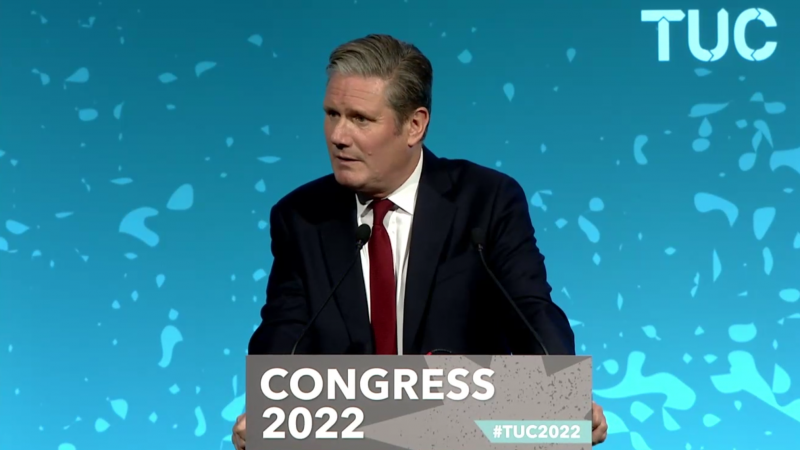
Keir Starmer has said that he “unequivocally” supports the right to strike and that he understands that it is “always a last resort” but added that “the single most important thing I can do is to make sure we win the next election”.
Addressing TUC Congress this morning, the annual gathering of the trade union federation, the Labour leader told those watching that the “Tory idea that working people give up their wages lightly in the worst cost-of-living crisis for a century is completely unserious about the pain people feel right now”.
Starmer said that trade unions that are taking industrial action are “representing the democratic choice of your members, you’re doing your job and I respect that”, adding: “But my job is different.”
“The single most important thing I can do for working people is to make sure we win the next election and get a Labour government. That is how we roll-out our green prosperity plan, how we deliver the new deal for working people, how we create a modern industrial strategy together,” the Labour leader said.
“None of this happens unless Labour is in power. So I will never be ashamed to say my Labour Party wants to increase worker power in our economy. But nor will I apologise for approaching questions on industrial action as a potential Labour government. The Labour Party is not doing its job when it’s in opposition.
“I will not let this be an era of Tory chaos, stagnation, attacks on working people. This can’t go on any longer. This cannot be a re-run of the 1980s. That’s what they want.”
Starmer described Liz Truss as “completely out of touch with the reality of the British economy” and argued that “working people will not be better off because we make the rich, richer”, saying the Conservatives’ trickle-down approach to the economy is “pure dogma”.
“The world has moved on from these discredited ideas. Every day the Tories stick to them, is a further nail in the coffin for Britain’s economic credibility,” he said.
“Our real problem is we create too many jobs that are low paid and insecure. We lock too many communities out of the wealth that we create. And our public services aren’t strong enough to help working people succeed.
“That’s why we struggle to grow – our economic foundations are too weak and the Tory argument is: that’s fine.”
The pound fell to its lowest level to date against the dollar, government borrowing costs soared and the Bank of England took emergency action in a bid to calm the markets in response to the ‘mini-Budget’ delivered by Kwasi Kwarteng last month.
Following Kwarteng’s sacking, after just 38 days as Chancellor, his successor Jeremy Hunt announced that the government will “reverse almost all the tax measures” unveiled in the mini-Budget that “have not started parliamentary legislation”.
The Chancellor also warned that there would be “difficult decisions” to come on spending. The Labour leader told TUC Congress that the Tories will “turn to austerity” to “get our country out of the hole that they dug”.




More from LabourList
‘Labour is being badly misled on housing’
Reeves bets on patience over populism
‘Energy efficiency changes must work for older private renters’